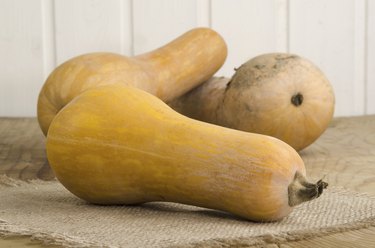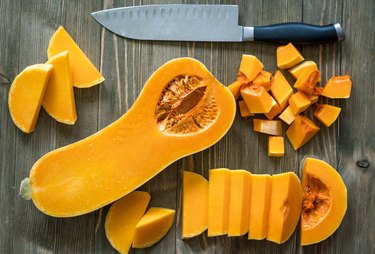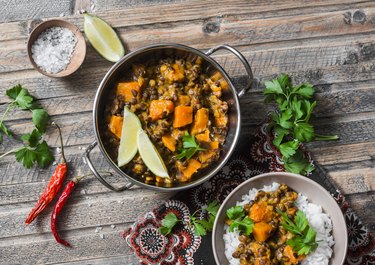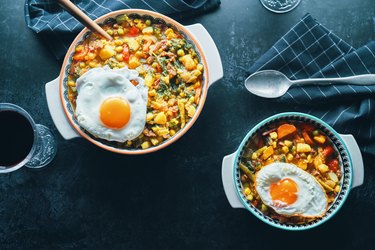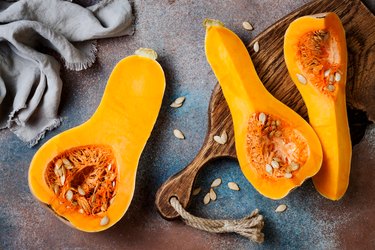
Butternut squash is one of the several varieties of winter squash belonging to the cucurbit family. Butternut squash nutrition benefits include its higher fiber content, as well as the large doses of vitamin A that the squash provides on your plate.
According to Michigan State University (MSU) Extension, butternut squash are harvested in the fall and have a long shelf life, thanks to their hard outer shells. Depending on the weather — because cold temperatures delay ripening — butternut squash must grow anywhere from 95 to 120 days before they can be eaten, per South Dakota State University Extension.
Video of the Day
Video of the Day
Butternut Squash Nutrition
Half a butternut squash's calories will depend on the weight of the whole squash. This will vary from one butternut squash to the next. According to the USDA, a cup of cooked butternut squash cubes weighs 205 grams and offers 82 calories.
A cup of butternut squash also has 1.84 grams of protein and 6.6 grams of fiber, or 26 percent of the daily value. Diets rich in fiber help maintain gut health and promote regular bowel movements. The butternut squash carbs in one cup are 21.5 grams, or roughly 7 percent of the recommended daily dose of this macronutrient.
Carbohydrates are one of three macronutrients the body requires as a source of energy. Butternut squash carbs also serve a role in the diet by assisting in the metabolism of glucose and cholesterol.
Butternut squash is also rich in vitamins and minerals. One cup of cooked squash offers 84.1 milligrams of calcium, 1.2 milligrams of iron, 582.2 milligrams of potassium and 59.5 milligrams of magnesium. It is also a source of vitamin C, vitamin E and vitamin K. These vitamins are necessary to help heal wounds, improve immunity and support overall body health.
Another butternut squash nutrition benefit is its vitamin A content. A cup of cooked butternut squash offers 1143.9 micrograms, or 127 percent of the recommended daily dose of vitamin A. This fat-soluble vitamin is important for vision, bone growth and maintaining the body's immune system.
Butternut Squash Benefits
Being high in vitamin A makes butternut squash naturally high in carotenoids as well, which are responsible for the vegetable's tough outer orange peel. According to the Linus Pauling Institute Micronutrient Information Center, carotenoids are red, orange and yellow pigments made by fruits and vegetables, with alpha and betacarotene being some of the most common forms.
The Office of Dietary Supplements at the National Institutes of Health (NIH) says that diets full of vitamin A may lower the risk of certain types of cancer. However, more research and clinical trials need to be conducted to test the effectiveness of vitamin A.
A September 2015 study in Foods found that the more mature a squash is, the higher the levels of carotenoid it will have. A cup of cubed butternut squash provides 87 percent of the recommended daily dose of beta carotene, 11 percent of the recommended daily dose of alpha carotene and 30 percent of the recommended daily dose of beta cryptoxanthin, another common carotenoid.
Along with its nutritious inside, butternut squash seeds can also be eaten for their health benefits. According to a January 2015 study in Horticulture Research, winter squash seeds are a good source of protein and fats. The seeds also have tocopherol, a form of vitamin E that helps improve the body's immune reaction to infections caused by free radicals.
- USDA FoodData Central: "Squash, Winter, Butternut, Cooked, Baked, Without Salt”
- Linus Pauling Institute Micronutrient Information Center: “Carotenoids"
- NIH Office of Dietary Supplements: “Vitamin A"
- Foods: "α-Carotene and β-Carotene Content in Raw and Cooked Pulp of Three Mature Stage Winter Squash “Type Butternut”"
- MSU Extension: "Enjoy the Taste and Health Benefits of Winter Squash"
- SDSU Extension: "Time To Harvest Those Winter Squash"
- Horticulture Research: "An Acorn Squash (Cucurbita Pepo Ssp. Ovifera) Fruit and Seed Transcriptome as a Resource for the Study of Fruit Traits in Cucurbita”
- MyFoodData.com: "Cooked Butternut Squash”
